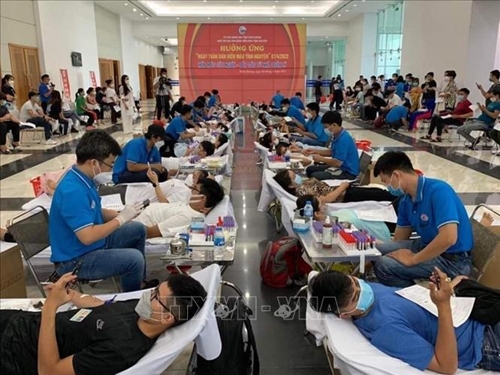Every year, Vietnam needs about 2 million blood units for emergency aid, medical treatment, and as reserves for accidents, disasters, and epidemics.
The voluntary blood donation movement has developed strongly, attracting the participation of people from all social strata, from students, civil servants, armed forces personnel, health workers, to religious dignitaries and workers.
Bach Quoc Khanh, Director of the National Institute of Hematology and Blood Transfusion (NIHBT), said public awareness has improved considerably compared to that 5 - 10 years ago. Despite the complex COVID-19 situation, whenever the institute faced blood shortages, it only needed to issue an appeal and thousands of blood donors would come right the next day.
    |
 |
|
The blood donation movement has developed on a large scale and won over widespread support. |
Shortages will no longer be a concern if all healthy people are ready to share their precious blood, he affirmed.
Khanh noted healthy people who make regular donations are the source of the highest blood quality and safety as they are always aware of the importance of protecting their health.
Not only helping save others' lives, donors can also gain benefits for themselves.
Regular blood donation, especially at young ages, help reduce the risk of hemochromatosis, thereby lowering the rate of strokes and cardiovascular diseases, according to the NIHBT.
Besides, donors will also benefit from free health check-ups and blood tests, be cared for after donation, and receive some gifts and a blood donation certificate that will enable them to receive a maximum of the same volume of blood they have donated free of charge when necessary.
The NIHBT expressed its hope that healthy people will donate blood regularly whenever they can since a large number of patients are waiting for it to sustain their lives every day and every hour.
Source: VNA